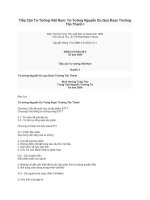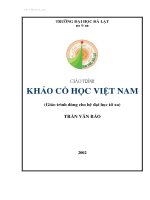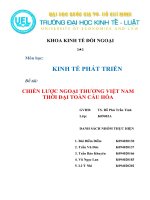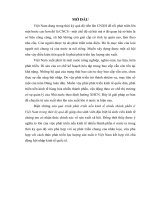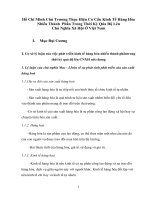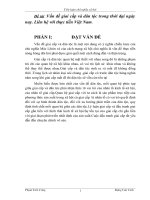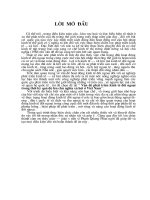Việt Nam 1
Bạn đang xem bản rút gọn của tài liệu. Xem và tải ngay bản đầy đủ của tài liệu tại đây (1.83 MB, 37 trang )
VIETNAM
A MODERN DAY AVOIDABLE
DISASTER
WAS GEORGE KENNON RIGHT?
A VERY INTERESTING POINT ABOUT
LONDON ARE THE ‘BLUE PLAQUES’
BUT NOT ALL ARE WELL
KNOWN
Ho Chi Minh
"It was patriotism, not communism, that inspired me."
General Giap
•
Hồ Chí Minh was born in 1890
•
During his childhood he developed a sense
that the Vietnamese were not treated well by
the French colonizers and the monarchist
government. Ho also received a modern
secondary education at a French-style lycee
in Hue
•
1911 he travelled to France working as a
kitchen helper. Rejected by the French
Colonial Administration School.
•
1912 to 1913, he lived in New York and
Boston, where he worked at the Parker
House Hotel
•
Between 1913 and 1919, Hồ lived in
London.
•
1919-1923, again living in France, Hồ
embraced Communism. Following WWI he
petitioned for recognition of the civil rights of
the Vietnamese at the peace talks, but was
ignored.
Linguist: Highly Traveled: Educated: Skilled
Insurgent War Organizer: Nationalist
•
1921, became a founding member of the Parti Communiste Français
and spent much of his time in Moscow, becoming the principal
theorist on colonial warfare.
•
In 1923, China. He stayed there in Hong Kong. In June 1931, he was
arrested and incarcerated by British police until his release in 1933.
•
He then made his way back to the USSR, where he spent several
years recovering from TB.
•
In 1938, he returned to China and served as an adviser with Chinese
Communist armed forces.
•
In 1941, Hồ returned to Vietnam to lead the Viet Minh independence
movement. He oversaw many successful military actions against the
Vichy French and Japanese occupiers.
•
Supported closely but clandestinely by the United States Office of
Strategic Services. He was treated for malaria and dysentery by
American OSS doctors.
FOR FRANCE: COLONIES WERE NOT JUST
ECONOMIC, THEY WERE PLACES TO RECEIVE
FRENCH CIVILIZATION
•
Many colonies were treated in
administration terms as if they
were part of Metropolitan
France.
•
Also in comparison the British
did not tend to ‘Make a Stand’
when events went against
them.
•
Having been beaten by the
Nazis France decided that in
1945 it must reassert its
position as a Great Power even
though its economy was in
ruins.
•
This would lead to two
disasters: VIETNAM -
ALGERIA
LE PETIT JOURNAL 1911
Justifying Tougher Control of Morocco by
Bringing ‘Civilization’
•
MARIANNE
•
Top RH a saluting
Moroccan takes orders.
•
France brining civilization
and prosperity to the
colonies.
•
Moroccans look in awe as
gold spills out of the horn
of plenty carried by
Marianne
RAPID SPREAD OF CONTROL IN INDO-
CHINA PARTICULARLY AFTER 1871
FRENCH EXHIBITION OF THE
COLONIES IN PARIS 1931
Sept.1940 Japanese Forces
Overwhelm Indo-China
•
France signed an armistice with Germany on
22 June 1940, leading to the Vichy
government in the unoccupied part of
France. Vichy also controlled most of French
overseas possessions, including Indochina,
one of the last access points for China to the
outside world.
•
Sept. 1940, Japan and Vichy Indochina
signed an accord.
•
NOTE: the Vichy colonial government could
continue to rule Indo-China as long as they
did what Japan wanted.
•
For Nationalists joint control was an
economic nightmare. The country's wealth,
exploited by the French, was now bled dry by
the Japanese in order to finance their
military effort. But politically it provided an
opportunity undreamed of as the French and
Japanese began to compete for the affection
of the Vietnamese.
AMERICA BECOMES INVOLVED
•
After the fall of France American diplomats faced a
problem. They had no fondness for the pro-Nazi Vichy
government in France but did not want to do anything that
would weaken France's hold on its colonies and pave
the way for a German occupation. The U.S. thus
recognized Vichy and encouraged the government in its
attempts to resist Japanese demands.
•
On the eve of WW2 the USA depended upon Indochina
for 50 percent of its raw rubber. Japanese control
deprived the U.S. of its major source of this strategic
resource. The U.S., acting in concert with Britain and
Holland, retaliated by cutting off Japan's oil supplies. In
negotiations that took place in the fall of 1941 with Japan,
the United States made several demands, including the
evacuation of Vietnam by Japanese forces. The Japanese
response to the American proposals was the attack on
Pearl Harbor.
U.S. supports Ho Chi Minh
Ho, Giap and American OSS
•
Ho Chi Minh and the Vietminh were happy to
receive the support of the U.S. mission in
China especially from the forerunner of the
CIA, the Office of Strategic Services (OSS).
•
When U.S. policy makers finally decided after
World War II that Ho Chi Minh was an
enemy, the extent of OSS assistance
became a matter of controversy. OSS
officials, perhaps fearful of accusations that
they had aided Communists, insisted that
only a few side arms had been given.
•
They also disputed how much help the
Vietminh had given in lighting the Japanese.
•
Bartholomew-Feis study hints that, had
America continued to champion the anti-
colonials and their quest for independence,
rather than caving in to the French, the USA
might have been spared our long and very
lethal war in Vietnam.
The Vietminh Prepare To Strike
•
With the French defeated, the
Vietminh moved consolidate their
position.. In April 1945 the Vietminh
began to plan for a national liberation,
placing the Vietnam Liberation Army
under the command of Giap.
•
Vietminh contact with American
intelligence officials also intensified.
•
Meanwhile, the British had established
their own commando operations in
Vietnam's northern mountains.
•
After the capitulation of the Japanese
in August 1945 Japanese troops still
occupied Indochina. But they
surrendered to the Vietminh and
Britain rather than to French
forces.
•
A provisional partition of Vietnam was
set up in 1945 with British troops in
temporary control in the South.
DECLARATION OF VIETNAMESE
INDEPENDENCE
•
On February 16th, 1945 Ho Chi Minh wrote a letter to
President Truman asking for American assistance in
gaining Vietnamese freedom. The letter closed with the
remarks:
•
“We ask what has been graciously granted to the
Philippines. Like the Philippines our goal is full
independence and full cooperation with the UNITED
STATES. We will do our best to make this
independence and cooperation profitable to the whole
world.”
•
I am dear Mr. PRESIDENT,
•
Respectfully Yours,
•
Ho Chi Minh
•
The letter was not declassified until 1972.
